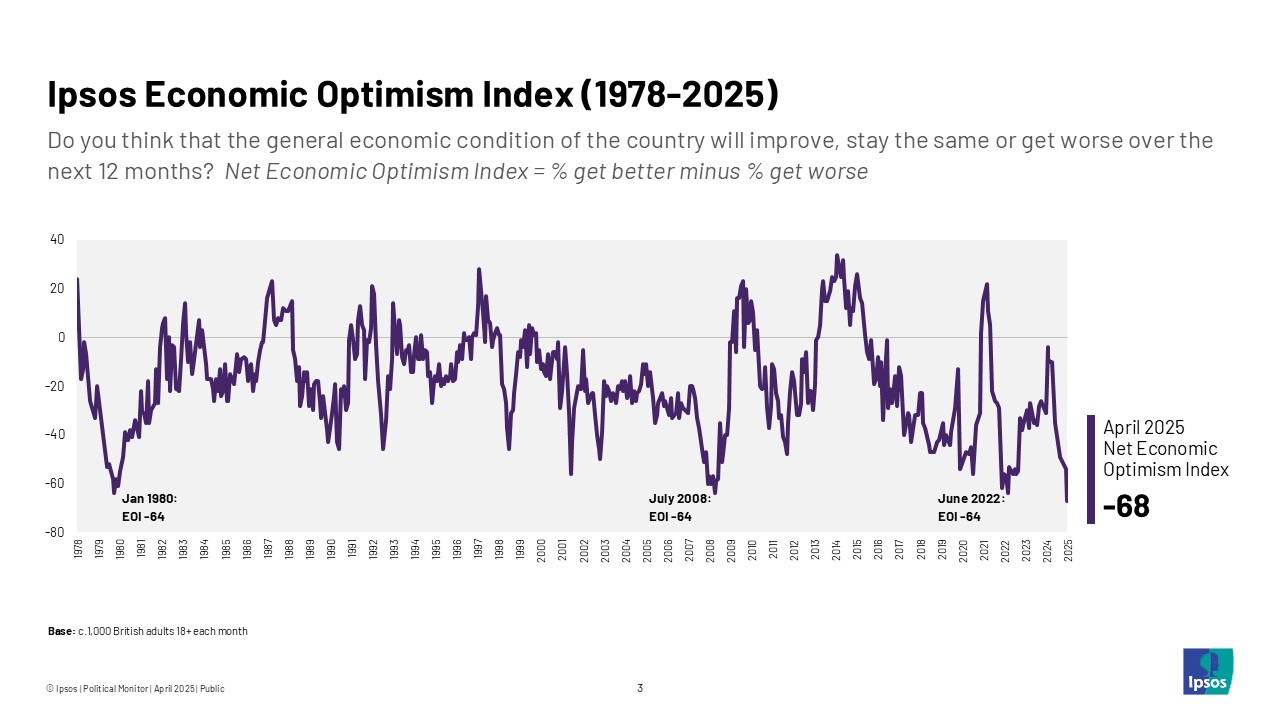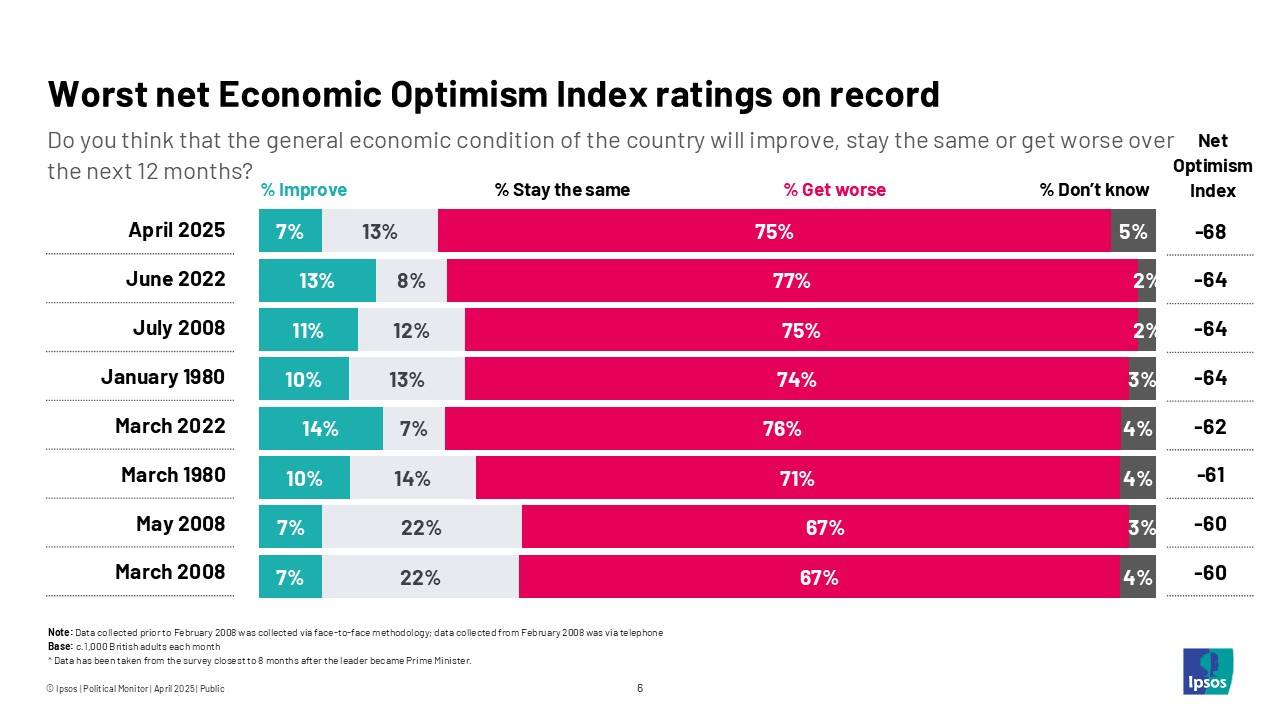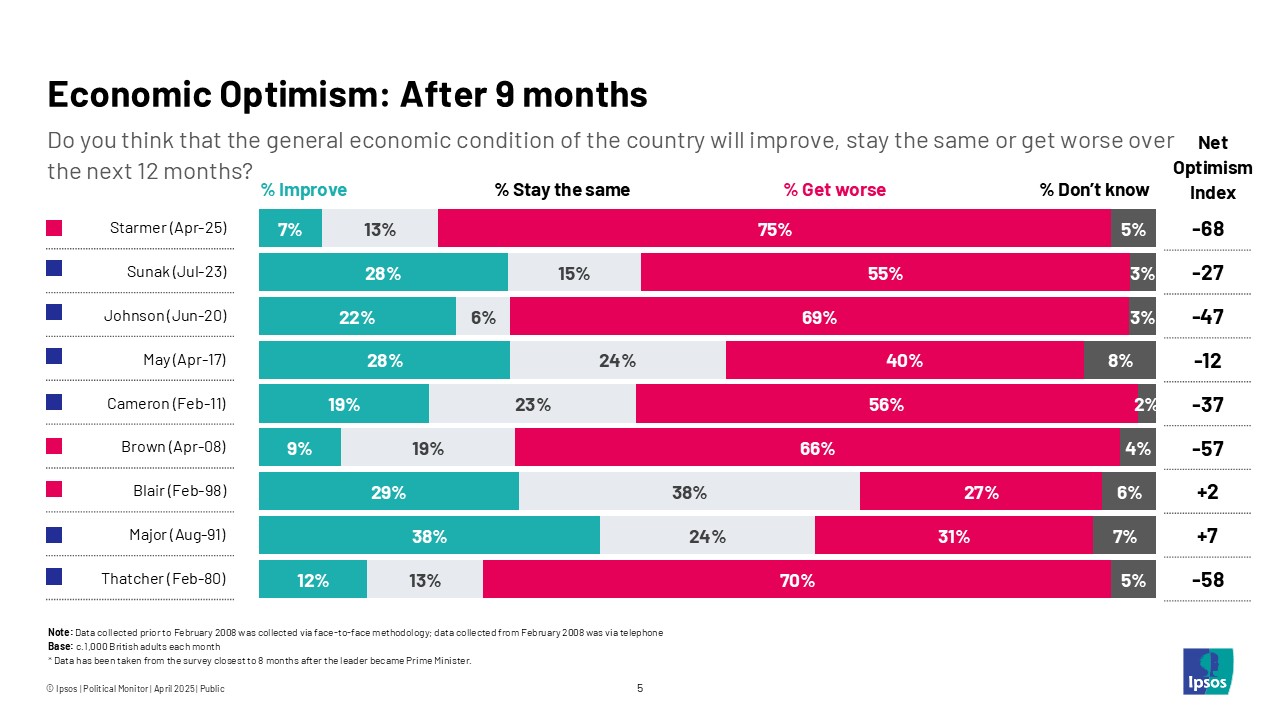Ipsos Economic Optimism Index falls to historic low
The latest Ipsos Economic Optimism Index (EOI) reveals that net economic optimism in Britain has fallen to the lowest levels ever recorded since Ipsos began collecting this data in 1978. In the latest data, collected 2-8 April 2025, 75% of Britons expect the economy to get worse over the next 12 months (up 8ppts since last month), and just 7% think it will improve, giving a net Ipsos Economic Optimism Index score of -68 (13% think economic conditions will stay the same).
This current net figure of -68 is even slightly lower than levels seen during some of the most challenging economic periods in recent history, including the January 1980 recession under Margaret Thatcher, after the winter of discontent (-64), the global financial crisis of July 2008 under Gordon Brown (-64), and the cost-of-living crisis triggered by the COVID-19 pandemic and the invasion of Ukraine in June 2022 (-64).

Key findings
- Deepening pessimism: Three in four (75%) Britons believe the general economic condition of the country will worsen over the next 12 months, while only 7% anticipate improvement (13% stay the same, 5% don’t know). This is a worsening of the public mood since last month, when 67% thought the economy would get worse and 13% better.
- Shared concern: This negative outlook is reflected across all demographics, with only minor variations between age groups, social grades, and genders. Men (-65) are slightly less negative than women (-71), and ABC1 social grades (-66) are marginally less pessimistic than C2DE grades (-72). All ages are also concerned, though with pessimism increasing with age at -59 for those aged 18-34 to -68 for 35-54 year olds and -75 for over 55s.
- Historical context: The current EOI of -68 is the lowest figure recorded in the past 47 years that Ipsos has been conducting this poll, underscoring the severity of the current economic sentiment. These previous lows coincided with periods of significant economic hardship, including the recession of 1980, the financial crisis of 2008, and the onset of the cost-of-living crisis in 2022.

- Comparison across Prime Ministerships: Analysis of economic optimism nine months into the tenures of various Prime Ministers reveals that the current level of pessimism is the lowest recorded at this stage in office. The previous lowest figure of -58 was recorded in February 1980, nine months into Margaret Thatcher’s tenure in office.

Commenting on the findings, Gideon Skinner, Senior Director of UK Politics at Ipsos said:
Our latest Economic Optimism Index reveals a stark reality: economic optimism in Britain, already in pretty scant supply, has fallen even further to a historic low, to levels last seen during major economic crises like the recession of 1980, the financial crisis of 2008, and the start of the cost-of-living crisis in 2022. We know Britons are feeling concerned about the impact of tariffs imposed by the US, and it’s likely that this has had an impact in deteriorating economic confidence. However, even before then there was widespread anxiety amongst the public over the state of the economy, with it consistently topping the Ipsos Issues Index over the last 6 months and pessimism about the economy already up 30ppts compared with last June even before this month’s figures. This adds up to a significant challenge for Labour, made harder by the concerns over the recent global economic situation, but also reflecting longer-standing public worries over the economy and their standards of living. Few Prime Ministers have faced this level of economic pessimism at this stage in office, but with public attention turning to the impact of Labour’s policy decisions as well as the effects of global economic forces, this underscores the need to restore confidence in the UK economy, and in a way that the public can start to feel some tangible benefits.
Technical note:
- Ipsos interviewed a representative sample of 1,010 online British adults aged 18+. Polling was conducted between the 2nd and 8th April 2025.
- Data are weighted to match the profile of the population. All polls are subject to a wide range of potential sources of error.




